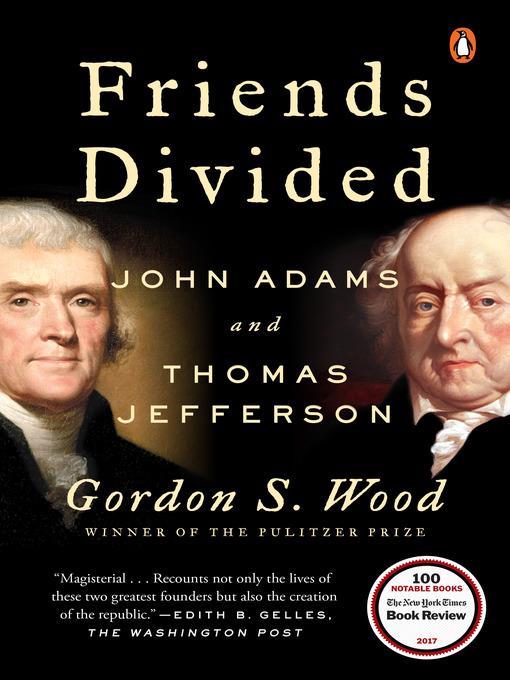
Friends Divided
John Adams and Thomas Jefferson
کتاب های مرتبط
- اطلاعات
- نقد و بررسی
- دیدگاه کاربران
نقد و بررسی

August 21, 2017
Wood (The Idea of America), a Pulitzer and Bancroft prize–winning professor of history at Brown, harnesses a career’s worth of historical knowledge to produce an artful tale of two of the most accomplished founding fathers. “The ironies and paradoxes expressed in the lives of these two Founders epitomize the strange and wondrous experience of the nation itself,” Wood explains. Though the U.S. emerged as a sovereign nation, its people remained divided by conflicting political philosophies. Adams and Jefferson often ended up on opposite sides, with political differences driving an almost irrevocable wedge between them. Tracing the trajectory of this fragile friendship, Wood reveals how and why Jefferson rather than Adams has endured as the embodiment of the nation’s heritage. Through the first two chapters, Wood introduces Adams and Jefferson by comparing and contrasting their backgrounds and characters. The two men became acquainted during meetings of the Second Continental Congress, where they agreed on the divisive question of independence. Later, political differences surfaced over the new U.S. Constitution, the French Revolution, and American party politics, all of which strained their friendship. Wood glides through the political intricacies and intrigues of the times, offering incisive analyses, especially of the ongoing debate over slavery, finely illuminating the minds of Adams and Jefferson.

Starred review from August 1, 2017
The acclaimed historian engages in a compelling examination of the complex relationship of the Founding Fathers who eventually served as the second and third presidents of the United States.It is well-known that John Adams and Thomas Jefferson lived long lives and famously died on the same day, July 4, 1826. But what might be lesser known is that these two men of vastly different personalities and political views went from close allies to enemies to late-in-life friends. Adams was a self-made man who could seem abrupt and did not win admirers easily. Jefferson, on the other hand, was born to a life of privilege and honor, and he acted diplomatically almost without fail. Northerner Adams felt certain that humans could never achieve full equality, but he opposed slavery. Southerner Jefferson seemed to believe in the possibility of equality yet owned slaves. A leading historian of the Revolution and winner of both the Pulitzer and Bancroft prizes, Wood (History/Brown Univ.; The Idea of America: Reflections on the Birth of the United States, 2011, etc.) traces how these two remarkable yet flawed men viewed each other through the decades and how the changing nature of their relationship influenced the public policy of their fledgling nation, at home and overseas. The author is especially adroit at explaining how Adams' ambassadorship to England and Jefferson's ambassadorship to France altered their views of the world and to some extent accelerated the conflicts between them. Wood also clearly explains Jefferson's popularity among nonhistorians, while Adams often seems overlooked in lay discussions of early American history. Among the other well-known personages in the narrative are Abigail Adams, Alexander Hamilton, and Benjamin Rush, all portrayed vividly by the author, whose approachable writing style is equal to his impressive archival research. An illuminating history of early Americans that is especially timely in the ugly, partisan-filled age of Trump.
COPYRIGHT(2017) Kirkus Reviews, ALL RIGHTS RESERVED.

October 1, 2017
Both John Adams (1735-1826) and Thomas Jefferson (1743-1826) died on the golden jubilee of America's founding, within hours of each other. This well-known story opens Wood's (history, Brown Univ.; The Idea of America) biography of an unlikely friendship that had the power to bring the nation together; yet, one also fraught with an ideological divide that threatened the strength of their relationship. Adams, a middle-class pessimist, was known for telling hard truths that he believed the American people needed to hear. Jefferson, in contrast, was a slave-holding aristocrat who espoused the exceptional nature of Americans and told people what they wanted to hear. Wood's outstanding scholarship and beautiful, masterly prose tells each man's experience, and he's unafraid to discuss hard facts, such as Jefferson's blind spot on slavery or Adams's reverence for the British monarchy. More importantly, their friendship reveals why Americans remember the words of Jefferson over those of Adams. Jefferson's charm and optimistic view of the American experiment better fit Abraham Lincoln's unification narrative as the Union started to crumble. VERDICT Essential reading from a Pulitzer Prize-winning giant of early American history for both casual history readers and historians.--Jessica Holland, Univ. of Kentucky, Lexington
Copyright 2017 Library Journal, LLC Used with permission.

























دیدگاه کاربران